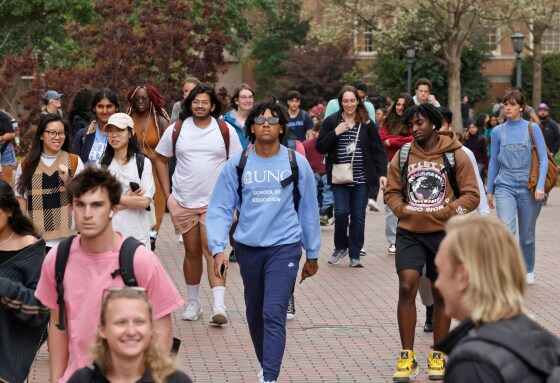Foreign
US Supreme Court strikes down college affirmative action programs
Published
10 months agoon
By
Vida Essel-Lamptey
The Supreme Court on Thursday struck down affirmative action programs at the University of North Carolina and Harvard in a major victory for conservative activists, ending the systematic consideration of race in the admissions process.
The court ruled that both programs violate the Equal Protection Clause of the Constitution and are therefore unlawful. The vote was 6-3 in the UNC case and 6-2 in the Harvard case, in which liberal Justice Ketanji Brown Jackson was recused.
The decision was hailed by prominent conservatives, who say the Constitution should be “colorblind,” with former President Donald Trump calling the ruling “a great day for America.” Liberals, however, condemned the ruling, saying affirmative action is a key tool for remedying historic race discrimination.
“It wasn’t perfect, but there’s no doubt that it helped offer new ladders of opportunity for those who, throughout our history, have too often been denied a chance to show how fast they can climb,” said former first lady Michelle Obama, the first Black woman in that role.
President Joe Biden called the decision a “severe disappointment,” adding that his administration would provide guidance on how colleges could maintain diversity without violating the ruling.
The court effectively overturned the 2003 ruling Grutter v. Bollinger, in which the court said race could be considered as a factor in the admissions process because universities had a compelling interest in maintaining diverse campuses. In doing so the court scrapped decades of precedent, including one ruling dating to 1978, that upheld a limited consideration of race in university admissions as a way to combat historic discrimination against Black people and other minorities.
In the majority opinion, Chief Justice John Roberts did not explicitly say that the former precedents were overruled, but in a concurring opinion conservative Justice Clarence Thomas, only the second Black justice to be appointed to the court, said that the Grutter case was “for all intents and purposes, overruled.”
Roberts wrote that both programs “lack sufficiently focused and measurable objectives warranting the use of race, unavoidably employ race in a negative manner, involve racial stereotyping, and lack meaningful end points.”
The ruling exposed stark divisions among the justices, who sit on a court that is more diverse than it has ever been.
Jackson, the first Black woman to serve on the court, wrote in a dissenting opinion that the ruling was “truly a tragedy for us all.”
Justice Sonia Sotomayor, another liberal and the first Hispanic justice, wrote that the court “stands in the way and rolls back decades of precedent and momentous progress.”
Sotomayor, in a sign of her displeasure, read a lengthy summary of her dissenting opinion in the courtroom.
Thomas, a long-term critic of affirmative action, wrote his own 58-page opinion in which he called the programs in question “rudderless, race-based preferences designed to ensure a particular racial mix in the entering classes.”
Both policies “fly in the face of our colorblind Constitution and our nation’s equality ideal,” he added.
While Thomas read his opinion from the bench, Jackson stared straight ahead and appeared visibly angry.
The ruling is another example of the court, which has a 6-3 conservative majority, delivering on the long-held goals of conservative legal activists. It follows in the wake of the seismic ruling in 2022 that overturned Roe v. Wade, the landmark 1973 decision that guaranteed a right to abortion.
The court’s decision is a major blow to the most selective universities that say some consideration of race is vital in ensuring they have diverse student bodies.
The small number of schools that have extremely competitive admissions programs are the most affected. They have predicted that rulings against the colleges will lead to a significant drop in the enrollment of minority students and require admissions officers to experiment with new race-neutral plans intended to counteract the impact. The vast majority of colleges accept almost all applicants and will not be as affected.
Among the dozens of institutions with admissions policies that take race into account are Yale University, Brown University, Columbia University, the University of Pennsylvania, the University of Chicago and Dartmouth College.
Roberts left open the possibility of colleges considering the discussion of race in an individual student’s application, citing the example of someone who personally encountered racial discrimination.
The student “must be treated based on his or her experiences as an individual — not on the basis of race,” he added.
Source: nbcnews
You may like
-


US gives 1.1 million rounds of ammunition seized from Iran to Ukraine
-


US House Speaker forced out of office in a historic vote
-


Canadian woman jailed 22 years for mailing Donald Trump ricin
-


Prof Gyampo elected President of UTAG, University of Ghana branch
-


20,000 crowd defies heavy downpour to welcome Messi to Inter Miami
-


Third of Americans under extreme heat advisories



Mahama leads NDC to mourn with Kufuor over wife’s passing
Former President John Dramani Mahama on Wednesday, October 4 led a delegation from the National Democratic Congress (NDC) to visit...


Former First Lady of Ghana Theresa Kufuor reported dead
The former First Lady of Ghana and wife of Ghana’s former President, John Agyekum Kufour, Mrs Theresa Kufuor has been...


The most powerful tool for change is the right to vote – Mahama
The 2024 flagbearer of the National Democratic Congress (NDC), John Dramani Mahama, is rallying Ghanaains who have grown disillusioned with...


PFJ was a mere state resource looting platform – Minority
The Minority has descended heavily on the Akufo-Addo-led government for launching a second phase of the flagship Planting for Food...


ECOWAS is desecrating Ghana
The Director of Legal Affairs of the National Democratic Congress (NDC), Mr Abraham Amaliba has said the Economy Community of...


Prof Gyampo elected President of UTAG, University of Ghana branch
A Senior Lecturer at the Political Science Department of the University of Ghana (Legon), Prof Ransford Gyampo have been elected...
